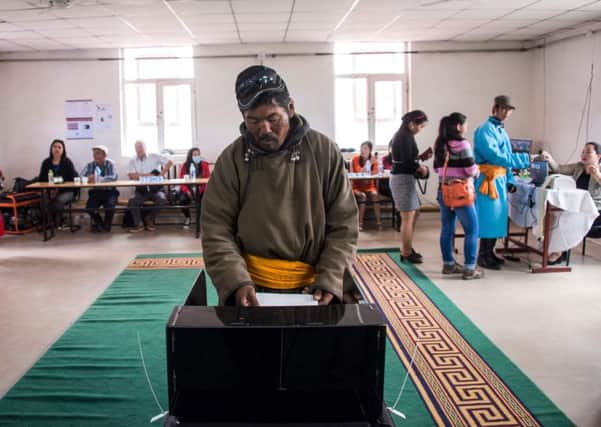Slowdown in China's economy overhangs Mongolia's election


Rising unemployment and disillusionment with the political system are also factors weighing on the vote for the 76 members of the national parliament, the State Great Khural. The result could see the ruling Democratic Party lose its majority to the opposition Mongolian People’s Party, a year ahead of the 2017 presidential election.
President Elbegdorj Tsakhia urged Mongolians to participate in the lively democratic system that remains a rarity in a region characterised by one-party states and authoritarian leaders.
Advertisement
Hide AdAdvertisement
Hide Ad“I encourage young people to come to the polling stations to exercise their right to vote,” Elbegdorj said after casting his ballot in the capital Ulaan Baatar.
Official results are not expected until this morning, reflecting the vast distance and poor communications in the nation of just 3 million sandwiched between China and Russia.
The parliamentary elections are the seventh since the country peacefully transitioned to democracy in 1990. Yet disillusionment is growing among younger voters, whose turnout has steadily declined in the country recently dubbed “an oasis of democracy” by US Secretary of State John Kerry.
Sodnomtseren Choinzon, chairman of the General Election Commission of Mongolia, said 498 candidates were running for parliament and 2,288 candidates for local councils. More than 400 observers from foreign countries and non-governmental organisations were on hand to oversee the polls.
Mongolia’s economy, based on mining and animal herding, has been dragged down by weak domestic demand and slipping exports, impoverishing thousands of former herders who had moved to its few cities looking for jobs.
Economic growth has slipped from 17.5 per cent in 2011 to 2.3 percent last year, leaving one-fifth of the population in poverty. Billions of dollars in foreign loans begin coming due next year, posing another potential crisis.
Coal, copper and other mineral resources make up 94 per cent of Mongolia’s exports. But with demand in key market China weakening as its economy cools, Mongolia’s own growth is forecast to fall below 1 per cent this year.